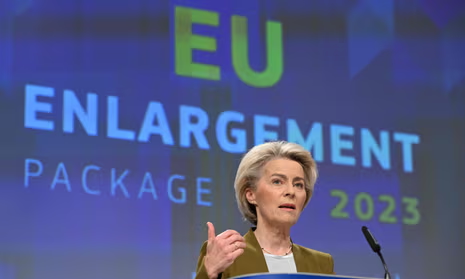The European Union stands at a critical juncture, with the prospect of admitting new members looming large on its agenda. Russia’s invasion of Ukraine has thrust the issue of EU expansion back into the spotlight, transforming it from a low-priority concern to a strategic imperative. As Ursula von der Leyen, President of the European Commission, recently emphasized at a forum in Bled, Slovenia, Europe’s security is now inextricably linked to the enlargement of the 27-nation union. This renewed focus on expansion offers hope for progress, but it also presents significant challenges that must be addressed for the process to succeed.
The Western Balkans: A Test Case for EU Expansion
For nearly two decades, six Western Balkan countries – Albania, Bosnia and Herzegovina, Montenegro, North Macedonia, Serbia, and Kosovo – have been promised the possibility of EU membership. However, progress has been painfully slow. The region’s unique geopolitical situation adds complexity to the enlargement process. Unlike countries in Eastern Europe, the Western Balkans don’t primarily seek EU membership for security guarantees, as many are already NATO members or have a significant NATO presence.
The recent momentum around EU enlargement, largely driven by Ukraine’s membership drive, has inadvertently benefited the Balkan aspirants. It has led to the commencement of accession negotiations with Albania and North Macedonia, recognition of Bosnia and Herzegovina as an EU candidate, and the approval of a €6 billion growth plan for the region. This plan, if fully realized, could provide per capita funding nearly equivalent to what full EU members receive under the cohesion fund, potentially catalyzing significant economic convergence between the EU and the Western Balkans.
Eastern Europe: The New Frontier for New Members
The situation in Eastern Europe presents a different set of challenges and opportunities for EU expansion. Countries like Ukraine, Moldova, and those in the Caucasus region view EU membership as a crucial security guarantee in the absence of NATO protection. The Russian invasion of Ukraine has intensified these countries’ desire for EU integration and has forced the EU to reconsider its approach to enlargement in this region.
Ukraine’s EU membership drive, in particular, has created a sense of urgency and competition among aspiring members. This has had the positive effect of accelerating reforms and increasing engagement with the EU, but it has also raised concerns about creating a two-tier system of enlargement that could leave some countries behind.
Reforming the Enlargement Process
One of the most significant obstacles to EU expansion has been the ability of individual member states to block progress for their own national interests. This has led to constant shifts in the goalposts for applicant countries, undermining the credibility of the accession process. To address this issue, there are calls for a return to a more technical process led by the European Commission, with member states only required to approve the beginning and end of the accession process.
Implementing such reforms would require a critical mass of supportive member states to overcome potential resistance from outliers. Countries such as Germany, Slovenia, Austria, Croatia, the Czech Republic, Italy, and Slovakia have already shown support for integrating the Western Balkans. Others, like Poland and the Baltic states, have a vested interest in Ukraine and Moldova’s EU membership. Even recent converts to enlargement, such as France, could play a crucial role in building this critical mass.
The Path Forward for New Members
To make EU enlargement a reality, several key steps are necessary:
1. Raise the ambition of gradual integration, considering incentives such as inclusion in the Schengen area for aspiring members.
2. Factor in the financial implications of including new members in the EU’s next seven-year budget negotiations, which begin in early 2025 for the 2028-2034 period.
3. Reform the enlargement process to prevent individual member states from hijacking it for their own interests.
4. Build a coalition of supportive member states to create momentum for these reforms and overcome resistance from potential outliers.
The next Commissioner for Enlargement will play a crucial role in shaping this agenda and pushing for more ambitious integration measures. However, success will ultimately depend on the collective will of EU member states to prioritize the strategic importance of enlargement over short-term national interests.
The admission of new members to the European Union is no longer just a matter of expanding the bloc’s reach; it has become a question of ensuring its very survival in an increasingly complex and volatile geopolitical landscape. The EU’s ability to integrate the Western Balkans, respond to the aspirations of Eastern European countries, and reform its own enlargement process will be crucial tests of its relevance and adaptability in the coming years. As the world watches, the EU must demonstrate that it can evolve and grow, not just for the benefit of new members, but for the security and prosperity of all Europeans. The path forward may be challenging, but the potential rewards – a stronger, more resilient, and more influential EU – make it a journey worth undertaking.
















